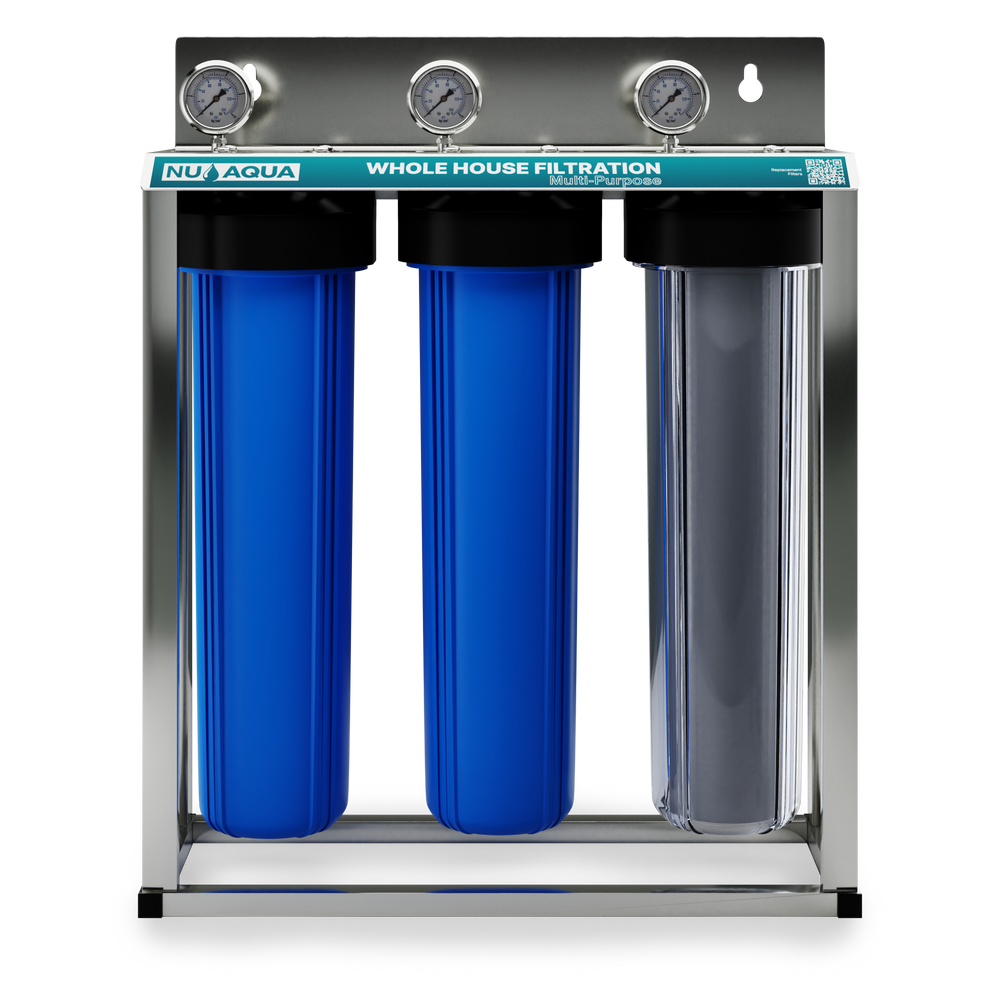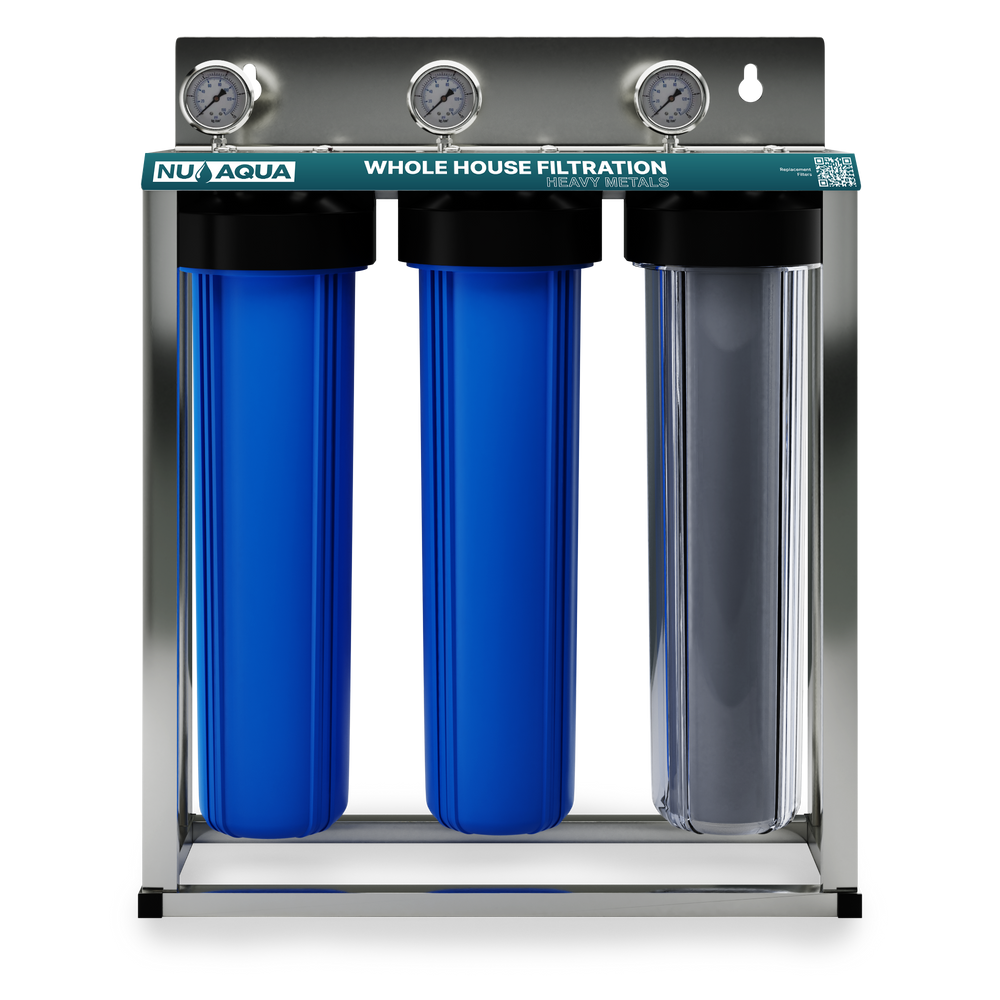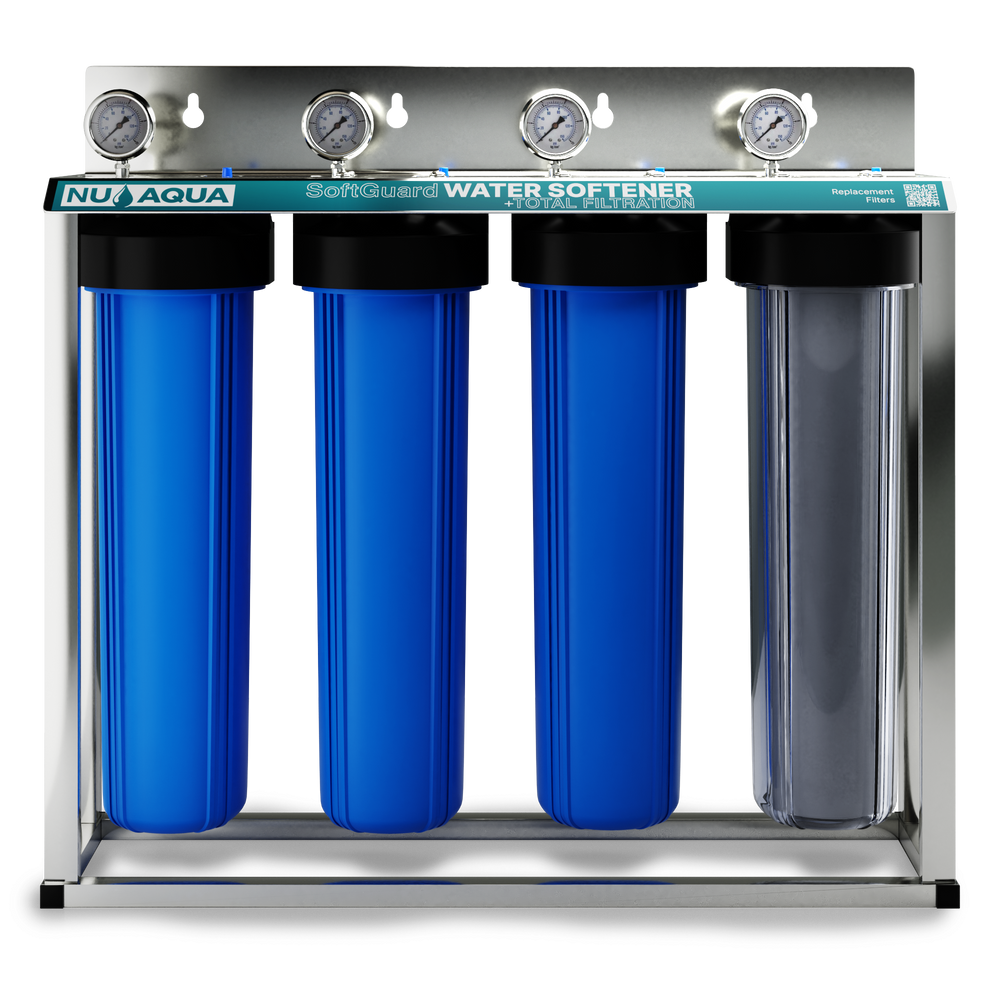
NU Aqua 3 Stage Whole House Water Filtration System
- Removes sediments & contaminants
- High flow whole-home coverage
- Easy maintenance filters
Whole House Filtration Systems
Choose the best solution for your home's water quality.



If you're seeking a comprehensive water filtration solution for your entire home, a whole house water filtration system is the perfect choice. Strategically installed at the main water line entering your residence, these systems ensure that every faucet, shower, and appliance receives pristine, filtered water.
Whole house water filtration systems remain discreetly tucked away, often in basements or utility rooms, ensuring they don't intrude on your living spaces. Yet, their impact is felt throughout your home, providing clean, refreshing water for all your needs, from drinking and cooking to bathing and laundering.
Whether you rely on a municipal water supply or a private well, these systems are designed to address various contaminants and impurities that may be present in your water source. From sediment and chlorine to heavy metals and other harmful substances, a whole house water filtration system offers a comprehensive solution for optimizing the quality of your home's water supply.
If you're seeking a convenient, effective way to enjoy clean, pure water throughout your entire home, a whole house water filtration system is an investment worth considering.
A whole house water filtration system is a comprehensive water treatment solution designed to filter and purify the entire water supply entering your home. These systems are typically installed at the main water line, ensuring that all water outlets, including showers, faucets, appliances, and plumbing fixtures, receive filtered water.
A whole home water filtration system is designed to remove a wide range of contaminants from your household's water supply. Common contaminants that whole home water filters can remove include:
The specific contaminants removed depend on the type of filtration media used in the system. Common filter media include sediment filters, activated carbon, reverse osmosis membranes, KDF media, and specialty media designed to target certain contaminants.
Higher quality whole home systems utilize multi-stage filtration with several different media types to comprehensively filter out a wider array of contaminants from your water. Always refer to the manufacturer's specifications on contaminant removal performance.
The effectiveness of whole home water filters at removing contaminants can vary significantly depending on factors such as:
Filter Media Type - Different filter media targets different contaminants. For example, activated carbon excels at removing chlorine, VOCs, and improving taste/odor, while reverse osmosis membranes are very effective at removing dissolved inorganic contaminants.
Filter Quality/Rating - Higher quality filters with tighter micron ratings and specialty media will be more effective than basic sediment filters.
Water Chemistry - The levels and types of contaminants present as well as water chemistry factors like pH can impact filter performance.
Filter Capacity/Size - Filters need to be properly sized for the home's water usage to allow for sufficient contact time.
Maintenance - Filters need to be changed per the manufacturer's recommendations to maintain effectiveness.
In general, high-quality whole home systems utilizing multi-stage filtration with carbon, sediment, and reverse osmosis or specialty media can remove 90-99% of most common contaminants when properly maintained.
Independent certification to NSF standards provides verification of a filter's contaminant removal claims. But even certified systems may not remove 100% of all contaminants perfectly.
The main difference between a whole home water filter and a point-of-use (POU) filter is the point at which they are installed and the amount of water they treat.
Whole Home Water Filter:
Point-of-Use (POU) Filter:
In summary, a whole home filter treats all the water throughout your home at the point where the supply line enters. A POU only filters water at one single tap or outlet. Whole home provides treated water to every fixture, while POU is localized.
Whole home is more comprehensive but costs more upfront. POU is less expensive but only filters water at that one location.
For most, yes. Most whole home water filtration systems require professional installation by a licensed plumber or water treatment specialist for several important reasons:
While some very basic single-stage systems could potentially be a DIY project for an experienced homeowner, professional installation is highly recommended for whole home water filters. Improper installation risks leaks, water damage, and an ultimately wasted investment in the equipment. Hiring a professional ensures proper setup and integration.
The frequency for replacing filters in a whole home water filtration system and the costs involved can vary based on several factors:
Filter Replacement Frequency:
Other specialty media filters: Annually or per manufacturer recommendations
The replacement schedules depend on the water quality, usage levels, and filter capacities in your specific system. Systems with higher water demand will require more frequent filter changes.
Typical Filter Replacement Costs:
Sediment filters: $30 each
Carbon filter cartridges: $40 - $50+ each
Filter media for larger tanks: $50 - $300+ to refill
Higher-end whole home systems with multi-stage filtration will have higher filter replacement expenses.
Some filters like sediment types just get rinsed while others are replaceable cartridges or media.
Whole home water filtration systems generally require regular maintenance to operate effectively and extend their lifespan. The amount of maintenance involved can vary based on the specific system type and configuration, but typically includes:
Filter Changes
System Flushing/Cleaning
Control Valve Service
Tank Air Recharge
General Inspections
The manufacturer's guidelines should be followed, but in general basic systems may just need filter swaps every 6-12 months. More complex multi-stage systems with specialty media will have increased maintenance requirements.
Keeping up with recommended maintenance helps the system work optimally, prevents problems, and extends its effective lifespan. Many homeowners opt for an annual service contract with a water treatment professional for added convenience.
The expected lifespan of a whole home water filtration system can vary significantly depending on several key factors:
Quality of System Components
Water Quality
Maintenance Consistency
Usage Levels
Environmental Conditions
Key components like tanks, control valves and RO membranes may need replacement during this time, but a well-maintained system should provide a decade or more of service life.
High quality installation, consistent monitoring, and environment also factor into maximizing a whole home filter's longevity.
Yes, a whole home water filtration system can potentially affect your home's water pressure and flow rate to some degree. Here are a few key points about how these systems impact water pressure and flow:
Water Pressure Drop
Flow Rate Reduction
Proper System Sizing
Most homeowners typically notice a slight water pressure decrease after installing a whole home filter, which is normal. However, excessively low pressure or flow likely indicates:
Well-designed and sized whole home systems can provide adequate pressure and flow for all but the highest water demand situations in most homes. But some reduction should be expected compared to untreated water.
Yes, there are several important plumbing requirements and considerations when installing a whole home water filtration system:
An experienced plumber can ensure all plumbing codes are followed and the system integrates seamlessly into the home's existing water pipes and infrastructure.


